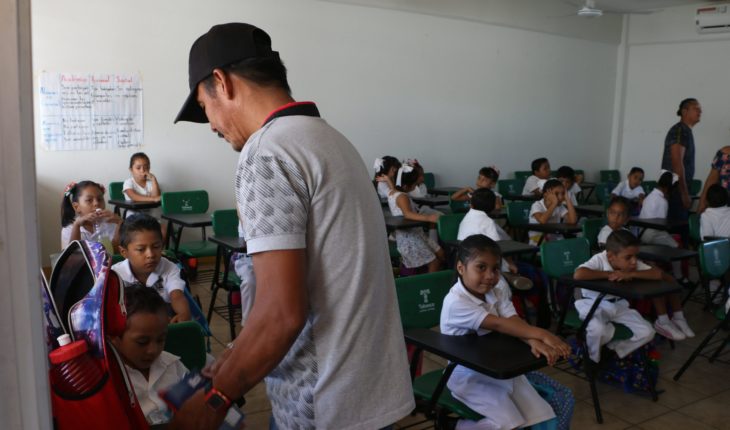The Ministry of Public Education (SEP) in Mexico fixed 40 thousand pesos per year the fee that will be awarded in 2020 to the country’s full-time schools, which operate with an extended schedule of up to eight hours to serve students of basic education, according to the new rules of operation of the program issued by the owner of the unit, Esteban Moctezuma, on Sunday, December 29 in the Official Journal of the Federation.
The figure represents a 56% cut in the resources that schools received since 2015, according to a review by Animal Político to the rules of operation of the last four years.
The pMI amount to these schools was 90,000 pesos, 50 thousand pesos more than the amount set for 2020.
You may be interested: More for scholarships, older adults and reforestation in the budget and less for young people
This amount was set out on the maximum amount of financial support for the “strengthening of equity and inclusion” item, which included technical assistance, conditioning and equipment; acquisition of educational materials and actions to address inclusion, abandonment, lag, and school use.
The new guidelines published this Sunday do not touch on the topic of the clipping to the Full-Time Schools program. What if set up are padlocks to prevent the money from the subdides granted through the Program from being used for other items.
Textually, it indicates that with respect to the “direct subsidy TG 1, under no circumstances may financial resources be used for the payment of financial benefits, compensation, salaries or bonuses to management, teacher or employees working in the PSE, the State Education Secretariats or the AEFCM, nor scholarships, medical treatments or direct financial supports to students; For TG 7, resources may be used in any specific expenditure item provided in the Spending Object Classifier. Under no circumstances may these resources be used for the payment of financial benefits, bonuses, compensation, as well as for international passages and travels, leasing for offices and equipment, or scholarships, medical treatments or direct financial supports to students”.
Read: SEP proposes Strategy to strengthen normal schools; Executive assigns less to teacher training
The new guidelines also set for the first time the maximum amounts of financial compensation for those in charge of students during overtime at school.
The management staff will be able to receive up to 5 thousand 17 pesos per month, teaching staff up to 4 thousand 265 pesos and support staff up to 1,81 pesos, between January and December and not counting the holiday period.
Full-Time Schools serves mostly working mothers who can leave their children at school on an extended schedule of six to eight hours a day with extra activities and, in some cases, they also receive food.
It was started in 2011, in the sixteenth of President Felipe Calderón and in the administration of his successor, Enrique Peña Nieto, the number of schools included was maintained and even increased.
Until 2019 it totaled 25 thousand campuses across the country, a thousand 505 more schools than in the last year of the government of President Enrique Peña Nieto, in 2018.
However, since the first year of President Andrés Manuel López Obrador’s rule, the program had a budget cut that it had not presented before. In 2019, when it had 10 billion pesos for operation, one billion less than the previous year when it had 11 thousand 243 million pesos.
By 2020 it will operate with half, i.e. with 5.1 billion pesos, as proposed in the Draft Budget of Egress for 2020.
In his first government report, published on September 1, 2019, President Andrés Manuel López Obrador reported that until June 30, 2019 they operated 25 thousand 639 “Full Time Schools (ETC) throughout the country, of which 68.4% are indigenous schools, of which 14 thousand 097 are located in rural communities, representing 55% of the total. These schools attended more than 1.1 million pupils and 3,427 campuses were attended by indigenous education.”
“The food offered in the ETC benefited one million 336 thousand children and young people who come to 12,891 schools, which accounted for 50.3% of the total, these schools are mostly in extreme poverty with a lack of access to food,” the Mexican government said.
What we do in Animal Político requires professional journalists, teamwork, dialogue with readers and something very important: independence. You can help us keep going. Be part of the team.
Subscribe to Animal Politician, receive benefits and support free journalism.#YoSoyAnimal
translated from Spanish: Full-Time Schools will have 56% less by 2020
December 30, 2019 |




